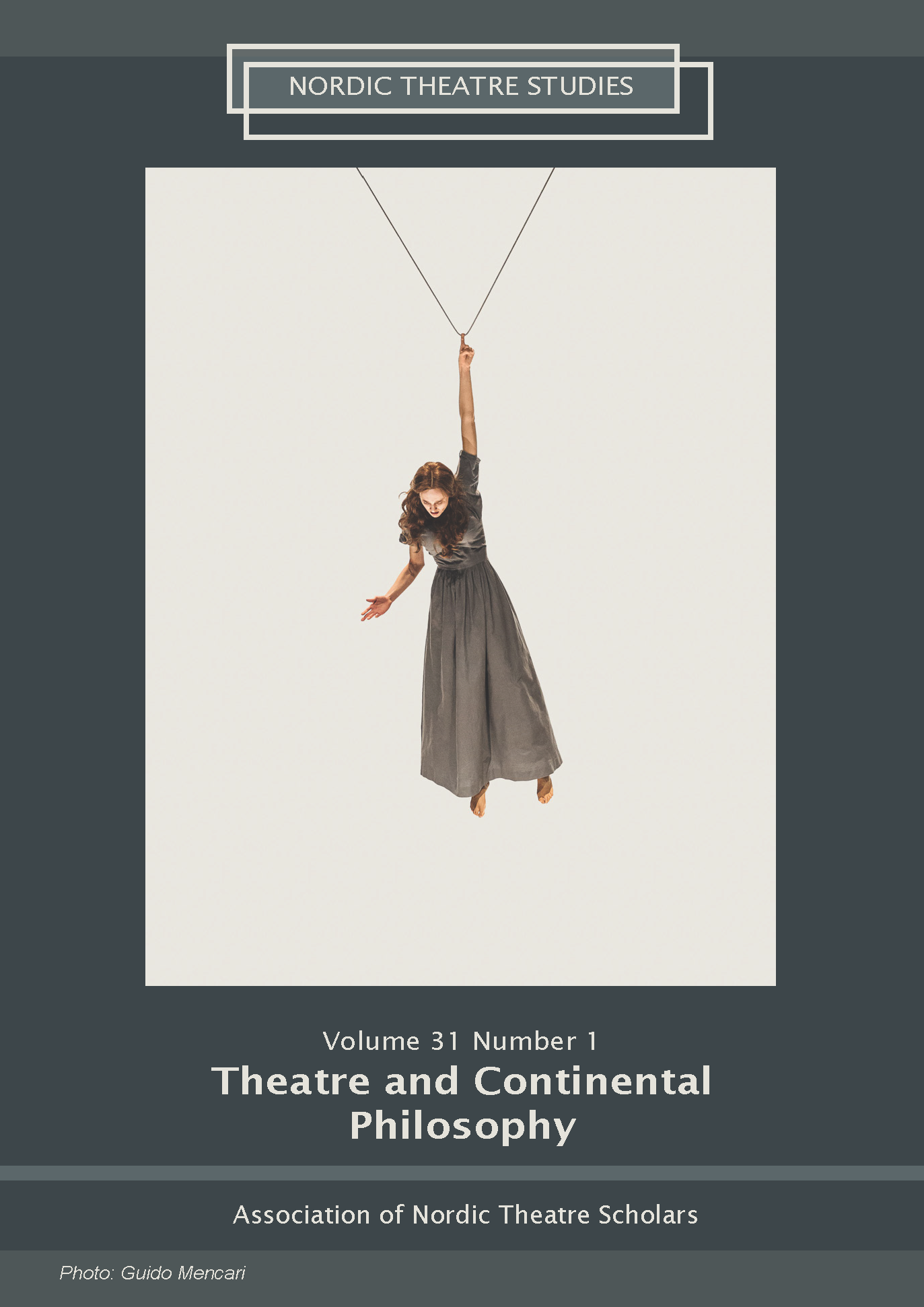‘Suddenly a Stranger Appears’
Walter Benjamin’s Readings of Bertolt Brecht’s Epic Theatre
DOI:
https://doi.org/10.7146/nts.v31i1.112998Keywords:
Walter Benjamin, Bertolt Brecht, Epic theatre, Performance theory, Critical Theory, Interruption, Estrangement effectAbstract
My contribution to the the NTS issue on Theatre and Continental Philosophy discusses a particular aspect of the complex intellectual and creative dialogue between the work and thinking of Walter Benjamin and Bertolt Brecht, beginning in 1929, the year they became close friends. Benjamin is no doubt the first critic of Brecht’s epic theatre, even planning to write a book about his artistic contributions. By examining the notion of the “Interruption” (Die Unterbrechung) and the sudden appearance of a stranger in three of Benjamin’s texts about Brecht’s epic theatre, I want to draw attention to Benjamin’s philosophical understanding of this ‘critical’ figure’ (the interrupting stranger), as one of the central aspects of the epic theatre. The essay is a prolegomenon for a more comprehensive study of this topic.
References
Benjamin, Walter. 1996a, “Goethe’s Elective Affinities”, translated by Stanley Corngold, in Selected Writings, volume 1, edited by Marcus Bullock and Michael Jennings. Cambridge, Mass.: Harvard University Press, 297-360.
Benjamin, Walter. 1996b, “Critique of Violence”, translated by Edmund Jephcott, in Selected Writings, volume 1, edited by Marcus Bullock and Michael Jennings. Cambridge, Mass.:
Harvard University Press, 236-252. Benjamin, Walter. 1998. “What is Epic Theatre? [First Version], Understanding Brecht, translated by Anna Bostock. London/New York: Verso.
Benjamin, Walter. 1999a. “The Author as Producer”, Translated by Edmund Jophcott, in Selected Writings, volume 2, edited by Michael W. Jennings, Howard Eiland and Gary Smith.
Cambridge, Mass: Harvard University Press, 768-782
Benjamin, Walter. 1999b. “Notes from Svendborg, Summer 1934”, Translated by Rodney Livingstone, in Selected Writings, volume 2, edited by Michael W. Jennings, Howard Eiland and Gary Smith, vol. 2. Cambridge, Mass: Harvard University Press, 783-791
Benjamin, Walter. 1999c. “Bert Brecht”, translated by Rodney Livingstone, in Selected Writings, volume 2, edited by Michael W. Jennings, Howard Eiland and Gary Smith. Cambridge, Mass: Harvard University Press, 365-371.
Benjamin, Walter, 2002. The Arcades Project, translated by Howard Eiland and Kevin McLaughlin. Cambridge, Mass.: Harvard University Press.
Benjamin, Walter. 2003a. “What is Epic Theatre? II”, Translated by Harry Zohn, in Selected Writings, volume 4, edited by Howard Eiland and Michael W. Jennings, vol. 4. Cambridge, Mass: Harvard University Press, 302-309.
Benjamin Walter. 2003b. “On the Concept of History”, translated by Harry Zohn, in Selected Writings, vol. 4, edited by Howard Eiland and Michael W. Jennings. Cambridge, Mass: Harvard
University Press, 389-400.
Brecht, Bertolt, 2015, “Messingkauf or Buying Brass” in Brecht on Performance, edited by Tom Kuhn, Steve Giles, and Marc Silverman. London: Bloomsbury.
Butler, Judith. 2017. “When Gesture Becomes Event”, in Inter Views in Performance Philosophy: Crossings and Conversations, eds. Anna Street, Julien Alliot and Magnolia Pauker. London: Palgrave Macmillan, 171-191.
Hölderlin, Friedrich. 1988. “Remarks on Oedipus’, in Essays and Letters on Theory, translated by Thomas Pfau. Albany: State University of New York Press, 101–108.
Downloads
Published
How to Cite
Issue
Section
License
The copyright belongs to the authors and Nordic Theatre Studies. Users can use, reuse and build upon the material published in the journal but only for non-commercial purposes. Users are allowed to link to the files, download the files, distribute the files on a local network (preferably by links), upload the files to local repositories if their institutions require them to do so, but not republish the files without proper agreements with the journal and the author.

